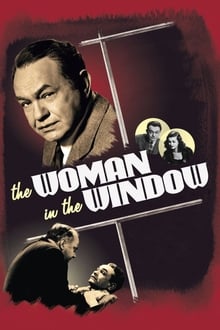
I was warned of the siren call of adventure.
The Woman in the Window is directed by Fritz Lang and adapted by Nunnally Johnson from the novel "Once off Guard" written by J.H. Wallis. It stars Edward G. Robinson, Joan Bennett, Raymond Massey & Dan Duryea. Music is by Arthur Lange and Milton R. Krasner is the cinematographer.
After admiring a portrait of Alice Reed (Bennett) in the storefront window of the shop next to his Gentleman's Club, Professor Richard Wanley (Robinson) is shocked to actually meet her in person on the street. It's a meeting that leads to a killing, recrimination and blackmail.
Time has shown The Woman in the Window to be one of the most significant movies in the film noir cycle. It was part of the original group identified by Cahiers du Cinéma that formed the cornerstone of film noir (the others were The Maltese Falcon, Double Indemnity, Laura and Murder My Sweet). Its reputation set in stone, it's a film that boasts many of the key noir ingredients: man meets woman and finds his life flipped upside down, shifty characters, a killing, shadows and low lights, and of course an atmosphere thick with suspense. Yet the ending to this day is divisive and, depending what side of the camp you side with, it makes the film either a high rank classic noir or a nearly high rank classic noir. Personally it bothers me does the finale, it comes off as something that Rod Serling could have used on The Twilight Zone but decided to discard. No doubt to my mind that had Lang put in the ending from the source, this would be a 10/10 movie, for everything else in it is top draw stuff.
At its core the film is about the dangers of stepping out of the normal, a peril of wish fulfilment in middle age, with Lang gleefully smothering the themes with the onset of a devilish fate and the stark warning that being caught just "once off guard" can doom you to the unthinkable. There's even the odd Freudian interpretation to sample. All of which is aided by the excellent work of Krasner, who along with his director paints a shadowy world consisting of mirrors, clocks and Venetian blinds. The cast are very strong, strong enough in fact for Robinson, Bennett and Duryea to re-team with Lang the following year for the similar, but better, Scarlet Street, while Lang's direction doesn't miss a beat.
A great film regardless of the Production Code appeasing ending, with its importance in the pantheon of film noir well deserved. But you sense that watching it as a companion piece to Scarlet Street, that Lang finally made the film that this sort of story deserved. The Woman in the Window: essential but not essentially the best of its type. 8/10